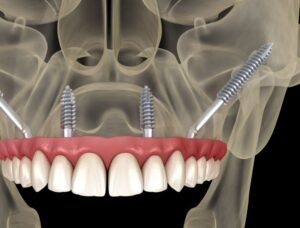
Dental implants have a widespread and well-deserved reputation as the best tooth replacement option. But did you know that there are several different types of dental implants? One particularly interesting form of this treatment is zygomatic dental implants. What exactly are they, and how do they work? This blog post explains some essential facts.
They Get Placed in the Cheekbone
Traditional dental implants get placed in a part of the jawbone called the alveolar ridge. Zygomatic dental implants, on the other hand, are anchored in the zygoma (that is just another word for cheekbone). They are longer than traditional implants and can provide a very sturdy base of support for artificial teeth in the upper dental arch.
They Are Designed for People with Bone Loss
Some individuals do not qualify for dental implants in their upper jawbone due to extensive bone loss. In some cases, a bone graft is the best way to build up the jaw so it can support regular implants. In other cases, zygomatic implants are the preferred option. They have a very high success rate, even among individuals who were previously told that dental implants were not right for them.
No Bone Grafting Is Required
A bone graft can extend the treatment timeline for dental implants by several months. That is because the body needs time to successfully bond with the grafted material. One neat feature of zygomatic implants is that they typically do not require any bone grafting, which means you may enjoy a very streamlined tooth replacement journey. They can even support prosthetic teeth immediately after they are placed!
They Can Replace All the Upper Teeth
Zygomatic implants are usually used for full-arch replacement in the upper jaw. Because of their stability, it is often possible to rebuild a full row of teeth with just a few implants. If you are missing just one or a few teeth in your upper arch, traditional implants would probably be the better option.
They Are Not Available Everywhere
Traditional dental implants are widely available; many general dentists are eager to provide them, and they often do a very good job when performing the treatment. However, the process for zygomatic dental implants is more complex. It is best handled by a specialist, such as an oral and maxillofacial surgeon.
Meet the Practice
Our oral surgery team features three talented specialists: Drs. Steve Koo, Thomas Weil, and William Shepard. Their years of experience and extensive training qualify them to offer many advanced services, including zygomatic dental implants. If you would like to find out if this treatment might be right for you, contact Piney Point Dental Implant Center at 713-597-7340.

